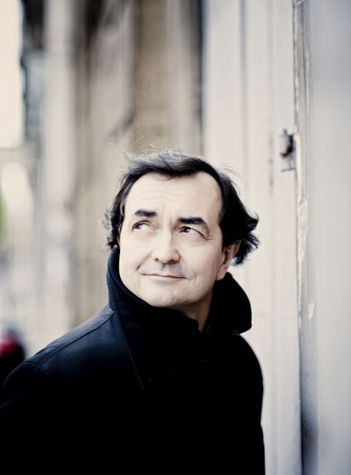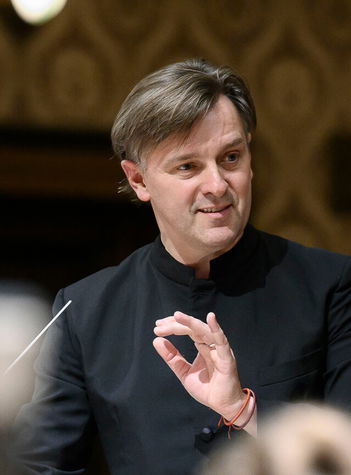1 / 6
Czech Philharmonic • Bad Kissingen
The Czech Philharmonic open the 2025 Kissinger Sommer Festival with the overture to Smetana’s opera The Two Widows. Ravel’s Piano Concerto in G major follows with French virtuoso Pierre-Laurent Aimard and for the grand finale, Dvořák’s Slavonic Dances, Op. 46.
Programme
Bedřich Smetana
The Two Widows, overture to the opera
Maurice Ravel
Piano Concerto in G major
Antonín Dvořák
Slavonic Dances, Op. 46
Performers
Pierre-Laurent Aimard piano
Tomáš Netopil conductor
Czech Philharmonic

To purchase online, visit the event presenter's website.
Performers
Pierre-Laurent Aimard piano

The French pianist Pierre-Laurent Aimard, who was acquainted with Boulez, Messiaen, and Ligeti, is regarded by most listeners as an interpreter of music of the 20th-century avant-garde, but when he appears at famous venues like New York’s Carnegie Hall or the Konzerthaus in Vienna, he also plays older music, bringing a new perspective to its interpretation. He is also unafraid to take on major projects like performing Beethoven’s complete piano concertos, which he programmed to open the 2020/2021 season as the artist-in-residence of the orchestra Musikkollegium Winterthur.
Foremost among the many honours Pierre-Laurent Aimard has received is the prestigious International Ernst von Siemens Music Prize for 2017. As the son of two neuropsychiatrists, it was actually by chance that he discovered music. While going through the attic of a relative, he found various musical instruments including a piano. “It was love at first sight”, he says. At first he studied at the conservatoire in his hometown Lyon, but at age 12 he was invited to join Yvonne Loriod’s studio at the Paris Conservatoire. He was fascinated by music of the 20th century from his childhood, playing his first piece by Schoenberg at seven years of age! Fortunately, he had the chance to develop that interest once he was older. An important step was collaboration with Pierre Boulez and his newly founded Ensemble intercontemporain, and later he advanced his career by working with such leading composers as György Kurtág, Karlheinz Stockhausen, Marco Stroppa, and Olivier Messaiaen.
Aimard’s 2018 recording of Messiaen’s Catalogue d'oiseaux earned the pianist many awards including Germany’s prestigious critics’ award Preis der Deutschen Schallplattenkritik. He has also won acclaim for recording the complete piano music of György Ligeti, some of whose compositions will be appearing on the programmes of Aimard’s concerts this season in Europe, North America, Japan, and China in honour of the 100th anniversary of Liget’s birth. Also awaiting him are two premieres: a piano concerto by Clara Iannotta at the festival Acht Brucken and the Portuguese premiere of the composition Se da contra las piedras la libertad by Klaus Ospald. He has also engaged in long-term chamber music collaboration with Tamara Stefanović and the jazz pianist Michael Wollny, and with the French actor Denis Podalydès he is preparing a special theatrical project with music by Ligeti, Kurtág, Schoenberg, and Cage.
Aimard is coming to Prague with Ravel’s Piano Concerto, which he has played with many ensembles including the Mahler Chamber Orchestra and George Benjamin at the BBC Proms, and his comprehension of Ravel’s music is also documented by a recording with the Cleveland Orchestra and Pierre Boulez (2010).
“I wouldn’t say that I’m a pianist—I’m a musician, and the piano just happens to be my instrument. I don’t like to limit myself to just a single function because that limits my perception of music”, says Aimard. Besides performing a wide range of repertoire as a pianist, he has also served in such positions as artistic director of the Aldeburgh Festival. He is a member of the Bavarian Academy of Fine Arts, and teaching has been an important part of this professional life: he has been an instructor at the Cologne University of Music and Dance and at Paris’s College de France, and he gives lecture concerts and workshops. In the spring of 2020 he relaunched his online project Explore the Score, which focuses on interpreting and teaching Ligeti’s music.
Tomáš Netopil conductor

An inspirational force, particularly in Czech music, Tomáš Netopil was Principal Guest Conductor with Czech Philharmonic from 2018-2024 performing regularly on tour and at concerts in the Rudolfinum Hall in Prague where he continues to conduct the orchestra’s New Year concerts which are live televised. In 2023/2024 season, Tomáš Netopil conducted opera productions including Janáček’s Jenůfa at the Hamburg Staatsoper and Dvořák’s Rusalka at the Prague National Theatre as well as symphonies with Frankfurt Opera Orchestra, Janáček Philharmonic Ostrava, Naples Philharmonic and Fort Worth Symphony Orchestra.
Opera productions in the 2024/2025 season include Mozart’s La Clemenza di Tito at the Grand Théâtre de Genève, Die Zauberflote with the New National Theatre Foundation, Tokyo and Don Giovanni with Oper Köln. Netopil explores a wide range of symphonic repertoire in engagements with Oslo Philharmonic, Antwerp, Kuopio and Sydney Symphony Orchestras, Hong Kong Sinfonietta and Accademia Nazionale di Santa Cecilia. This season sees a welcome return to L'Orchestre Philharmonique de Monte-Carlo as well as a debut with Orchestre National des Pays de la Loire. Another return is to Concentus Musicus Wien which builds on his work with period ensembles. As part of the Prague Spring Festival, Netopil will delight audiences with an authentic production of Mozart’s Requiem.
Seven years ago, Tomáš Netopil created the International Summer Music Academy in Kroměříž offering students both exceptional artistic tuition and the opportunity to meet and work with major international musicians. In summer 2021, in association with the Dvořák Prague Festival, the Academy established the Dvořákova Praha Youth Philharmonic with musicians from conservatories and music academies, coached by principal players of the Czech Philharmonic. Tomáš Netopil has held a close relationship with the Dvořák Prague Festival for some time and was Artist-in-Residence in 2017, opening the Festival with Essen Philharmoniker and closing the Festival with Wiener Symphoniker in Dvořák’s Te Deum.
Tomáš Netopil’s discography for Supraphon includes Janáček’s Glagolitic Mass (the first ever recording of the original 1927 version), Dvořák’s complete cello works, Martinů’s Ariane and Double Concerto, and Smetana’s Má vlast with the Prague Symphony Orchestra with whom he’ll become Chief Conductor and Music Director from 2025/2026 season. During his tenure in Essen, his releases included recordings of Suk Asrael and Mahler Symphony Nos. 2, 3 6 and 9.
From 2008-2012 Tomáš Netopil held the position of Music Director of the Prague National Theatre. He studied violin and conducting in his native Czech Republic, as well as at the Royal College of Music in Stockholm under the guidance of Professor Jorma Panula. In 2002 he won the 1st Sir Georg Solti Conductors Competition at the Alte Oper Frankfurt.
Compositions
Bedřich Smetana
The Two Widows, overture to the opera
“Experts who have had the opportunity to peruse the score are enthusiastic over the beauties of the new composition. The opera The Two Widows is said to be worthy successors to The Bartered Bride. The composition is rather in the character of the salon, but once again there is Smetana’s lovely music that seems to flow directly from the songful breast of the nation itself!” That is how Jan Neruda welcomed Bedřich Smetana’s new opera The Two Widows two weeks before its premiere. It was first played on 27 March 1874 at the Provisional Theatre under the composer’s baton. Apart from the unfinished opera Viola, The Two Widows is Smetana’s only stage work based on a play. The author of the one-act comedy Les deux veuves, premiered at Paris’s Thèatre Française on 14 May 1860, was the French dramatist Jean-Pierre Félicien Mallefille. Two years later, the play was given at Prague’s Estates Theatre in a German translation, and on 25 May 1868 it was played in Czech with the title Dvě vdovy (The Two Widows) at the Provisional Theatre. The translator was Emanuel Züngel, and naturally it was he who adapted it into a libretto for Smetana, who had been looking for new subject matter for a comic opera. In the spirit of the subject matter, Smetana modelled his opera after the genre of the French opéra comique, creating a conversational salon opera with spoken dialogues. Later on, after having gone deaf, he set about revising the opera; the new version with musical recitatives and other alterations was premiered at the Provisional Theatre on 15 March 1878. The overture sets the mood of the opera, makes use of catchy motifs associated with the story’s characters (the ill-humoured gamekeeper Mumlal, the widows Karolina and Anežka, and Ladislav), and is dominated by the characterful, lively rhythm of the polka.
Maurice Ravel
Piano Concerto in G major
Maurice Ravel did not leave behind a large musical legacy. Some biographers claim this was because of the composer’s other activities—he was also working as a concert pianist, a conductor, and a teacher. Others say it was his meticulousness and the exacting standards he set for himself. He wrote a number of individual compositions and cycles of pieces for his own instrument, the piano, including music for solo piano, for piano four-hands, and for two pianos. He also wrote two piano concertos, both during his late creative period, composing them simultaneously between 1929 and 1931. The Piano Concerto in D major for the left hand was written on commission for the one-handed pianist Paul Wittgenstein (1887–1961), who had also asked other composers of his day to write works for his repertoire.
In his Piano Concerto in G major, Ravel employed a variety of stylistic resources ranging from Spanish folk elements to the jazz influences of his day. He conceived the orchestral accompaniment in an original manner, giving various instruments room to play solo passages. The two outer movements contrast effectively with the melancholy central Adagio. The first movement in sonata form surprisingly repeats material from the development section after the recapitulation and cadenza. The slow movement opens with a long piano solo, with wind instruments taking up the theme one after another. The theme itself has been compared to that of the slow movement of Mozart’s Clarinet Quintet. The winds also play a major role in the orchestration of the rondo finale.
Ravel expected that, as with other works he had written, he would himself be the concerto’s first performer: “It was an interesting experience to work on both concertos at the same time. The one I will be playing myself is a concerto in the true sense of the word. What I mean is that it is written in the spirit of Mozart and Saint-Saëns. In my opinion, the music of a solo concerto has to be light and brilliant, and it should not strive for depth or for dramatic effects”, he wrote. However, problems with Ravel’s health prevented him from playing the piano part. The concerto was premiered on 14 January 1932 with Marguerite Long as the soloist and with Ravel leading the orchestra. The two artists then embarked on a four-month tour, during which they also played the new concerto on 18 February 1932 at a philharmonic concert of the New German Theatre in Prague: “A delicately crafted, polished composition full of spirit, taste, and precision, and a work of art clear as crystal, elegant, and lively”, wrote a Prague critic. “The piano part allows for both mechanistic playing and Lisztian virtuosity, though musicality is required above all in the difficult harmonic passages.” The audience even insisted that the final movement be repeated.
Antonín Dvořák
Slavonic Dances, Op. 46